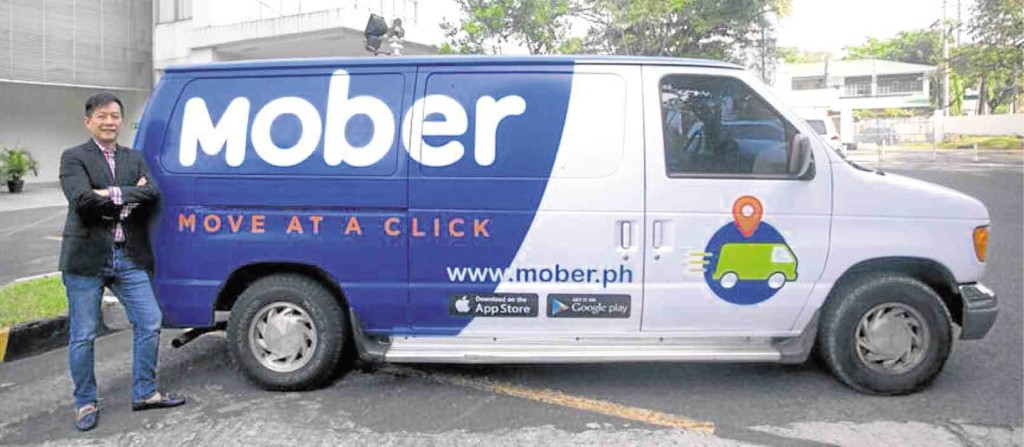The infamous Metro Manila traffic has been getting worse every year, causing billions in productivity losses every day.
With more than two million vehicles competing for limited road space around the metro, commuters as well as businesses wonder how this problem could finally be solved.
Seeking to provide a solution is Mober, a Philippine-based on-demand app that offers delivery services around Metro Manila.
By using the app—the first of its kind in the country—businesses no longer need to buy their own delivery vans and trucks, which will only add to the already huge number of vehicles choking the busy streets.
Convenient service
“Here in the Philippines, we’ve got nearly 900,000 small and mid-size businesses. Unfortunately, due to our terrible logistical structure, many of them were forced to invest big money into purchasing their own delivery vans, even if they barely use them,” says Dennis Ng, Mober founder and CEO.
By using Mober, sending parcels and cargos is now as convenient as booking a taxi. Mober has over 50 vans and trucks that can be easily booked by entrepreneurs for product deliveries—by restaurants to distribute items to their commissaries, by people who want their big purchases delivered on the same day straight from the furniture shops or department stores, or by pet owners who want to transport their beloved animals to the vet.
Ng started Mober in December 2015.
The idea came to him when he decided to bring his Hong Kong-based show business magazine to the Philippines.
“We were looking for a delivery service to hire, and we found out it’s very hard to find logistics that is affordable. We went to the online classified ads, but [the ones listed there] charged daily rates, even if you want to deliver just one or two items. So I thought, ‘Why not do an Uber for logistics?’” Ng says, referring to the popular car rental service.
The cargo delivery service business is already being offered in Hong Kong and in other Asian countries, but it’s a new concept here in the Philippines. Ng thought of bringing that kind of service to the country, which is fast-becoming a competitive economy in the region.
The app was made by Singaporean developers but maintained by a local developer group.
To avail themselves of the service, clients must download the app or go to the Mober website and register.
They have to indicate the pickup and destination points and the name of the recipient. For multiple deliveries, all the destinations must be clearly indicated.
Clients can also keep track of the progress of the vehicle and its location. Payments can be made via credit card or cash-on-delivery. When the delivery is done, drivers are rated by the clients, one way to ensure consistent service.
To test the market, Mober partnered with Noel Bazaar last Christmas.
They did the ingress and egress of the goods for the merchants, shuttling between locations. Eventually, the merchants themselves continued using Mober’s services in other bazaars.
Mober is also being used by established furniture and appliance stores for same-day deliveries. It is also in demand in the grocery delivery business.
It has proven to be a convenient way to move, ship and deliver items as transactions are executed using a mobile phone.
And although Mober is yet to offer refrigerated trucks, several restaurants have already availed themselves of Mober’s time-efficient services because of the convenience of sending prepared food items to their branches while maintaining the quality of their products.
Delivery options
Mober offers several kinds of vehicles to cater to different cargo needs.
It has five in-house vans and 50 on-board, or third-party vehicles such as Urvan, Hi-Ace and L-300.
Mober has over 200 third-party applicants for the fleet, and Ng says the target is to have 500 vans by yearend.
Its services are divided into Van, which is just the vehicle and the driver; Van Plus, which includes helpers, convenient for heavy and bulk deliveries; and Lorry, which are 4- and 6-wheeler trucks that can carry up to 25 tons. The vans can carry a maximum of 800 kilos of cargo.
Ng says there is a strict accreditation process in place to make sure that Mober drivers and vehicles meet quality and service expectations.
He gives the drivers clear instructions on what items are allowed for deliveries, but the drivers are free to consult him whenever they encounter difficulties.
For the safety of the public and the drivers, Mober refuses deliveries of guns, fireworks and items like gas tanks since Mober drivers are not experts in handling and transporting such dangerous cargos.
Then to ensure the safety of the cargo, Mober offers P50,000 insurance in case of damage or loss.
Ng also plans on adding seals after loading the cargo and locking the van, to provide more assurance that the van’s contents are not tampered with along the way.
Ready for competition
Although Mober is the only cargo delivery app service of its kind in the country, Ng is preparing for the arrival of competition, especially the established ones from other countries.
Also, it is bent on building its presence by establishing a foothold in Cebu.
“We will start recruiting vans by mid-July, and launch by August, after the Chinese ghost month. We also plan on expanding regionally, because if they (foreign companies) could go here, we could also go there,” Ng says.
For now, Ng says he is just glad to provide extra income for van and truck owners, whose vehicles had been barely used, but now get hired for up to four deliveries per day. This, aside from knowing that he is on his way to achieving his long term goal of helping lessen traffic while helping small and medium-scale entrepreneurs at the same time.
